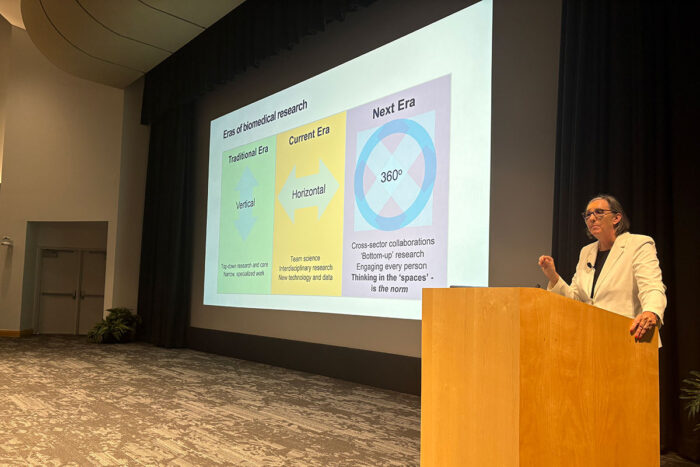NCI director delivers Korsmeyer lecture
Speaking to WashU scholars, cancer institute leader lays out future vision of U.S. cancer research
 Timothy J. Ley
Timothy J. LeyW. Kimryn Rathmell, MD, PhD, director of the National Cancer Institute, delivers the 19th annual Stanley J. Korsmeyer Memorial Lectureship Oct. 17 at the Eric P. Newman Education Center on the Medical Campus.
W. Kimryn Rathmell, MD, PhD, the director of the National Cancer Institute (NCI) of the National Institutes of Health (NIH), delivered the 19th annual Stanley J. Korsmeyer Memorial Lectureship at Washington University School of Medicine in St. Louis on Thursday, Oct. 17. Korsmeyer was a former WashU Medicine medical oncologist and researcher whose groundbreaking discoveries opened up new ways of understanding and treating cancer. He died of lung cancer in 2005 at age 54.
Speaking to a large audience of WashU Medicine faculty and trainees at the Eric P. Newman Education Center, Rathmell noted that her own research was inspired by Korsmeyer’s work, and she offered her perspective on the next era of cancer research in the U.S. and what it will take to further accelerate progress in the field.
Rathmell highlighted the country’s National Cancer Plan, which sets the ambitious goal of cutting cancer mortality in half by 2047. Citing progress in her own work on kidney cancer as an example, she called for the next era of cancer research to take a 360-degree view of the field in a way that fosters new types of collaborations and that includes a vision for researchers, patients and community members to contribute. She emphasized the importance of equity in the field, taking into consideration differences in race and gender in cancer research and treatment so that interventions benefit all patients. She also pointed to the central importance of cancer prevention and early detection, especially in light of recent trends showing an increase in cancer diagnoses among younger Americans.
Korsmeyer made groundbreaking discoveries in the understanding of programmed cell death — called apoptosis — and how cancer cells resist it. Prior to this work, scientists thought cancer developed because of too much cell proliferation. He remains one of the most widely cited researchers in the world, with more than 100,000 citations and counting.
In her remarks, Rathmell highlighted the exceptional work of WashU Medicine physicians and researchers at Siteman Cancer Center, based at Barnes-Jewish Hospital and WashU Medicine. Siteman is the only NCI-designated Comprehensive Cancer Center in Missouri and the surrounding region and is a national leader in cancer research and clinical care, pioneering the use of genome sequencing to guide cancer treatment. With three Specialized Programs of Research Excellence (SPORE) grants from the NCI — in blood, endometrial and pancreatic cancers — WashU Medicine researchers are at the cutting edge of the field.
The Korsmeyer lecture is part of Siteman Cancer Center’s Basic Science Seminar Series. Launched in 2006, it has brought six Nobel laureates and many other world-renowned scientists to the Medical Campus.






